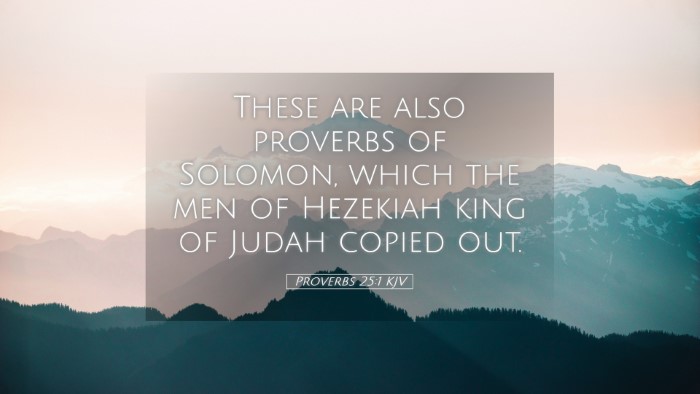Proverbs 25:1 - Commentary Summary
Verse: "These are also proverbs of Solomon, which the men of Hezekiah king of Judah copied out."
Introduction
The verse serves as a prelude to a collection of proverbs that King Hezekiah's men transcribed from the wisdom of Solomon. It signifies the continuation of wisdom through generations and the importance of preserving teachings that guide moral and ethical living. This collection enhances the understanding of divine wisdom imparted through the historical context in which the proverbs were utilized.
Contextual Background
This verse situates itself within the broader context of the Book of Proverbs, traditionally attributed to Solomon, noted for his wisdom. The compilation by Hezekiah's men indicates an effort to revive wisdom literature amidst Israel's spiritual decline. The focus on powerful leadership and instruction highlights that wisdom is not only for personal growth but is essential for societal stability.
Historical Significance
Hezekiah's reign marked a critical time for Israel, as he worked to reform worship, return to Yahweh, and confront the Assyrian threat. By collecting Solomon's proverbs, Hezekiah emphasized the relevance of divine guidance in governance and daily life.
Commentary Insights
Matthew Henry Commentary
Henry emphasizes that this verse not only introduces additional proverbs but also reiterates their value across time. He notes that Solomon’s wisdom is divinely inspired and transcends cultural boundaries, serving as an everlasting foundation for moral behavior. The act of copying implies fidelity and respect for the wisdom, further asserting that the pursuit of knowledge and insight is a worthy endeavor.
Albert Barnes' Notes
Barnes notes that the proverbs compiled here are meant to be practical teachings for daily living. He discusses the authority of Solomon's words and their intended audience, suggesting they are directed at both leaders and common people. This underscores the democratic nature of wisdom; it is accessible to all who seek it. The mention of Hezekiah’s men reflects a commitment to revitalizing righteous living, encouraging communities to embrace wisdom as a guiding principle.
Adam Clarke’s Commentary
Clarke focuses on the editorial process undertaken by Hezekiah’s men, implying a careful selection and preservation of the most poignant teachings. He observes that this indicates a serious reflection on leadership and morality in times of chaos. Clarke’s analysis suggests that wisdom serves as a stabilizing force, bringing order and peace within society, especially during turbulent times.
Application for Pastors and Theologians
The verse encourages leaders to take wisdom seriously and to promote it within their congregations. The historical context of Hezekiah’s reforms serves as a model for modern-day leaders who seek to navigate their communities through moral complexities.
- Preaching Wisdom: Utilize the principles found in Proverbs to address contemporary issues in a manner that upholds biblical truths.
- Generational Teachings: Emphasize the importance of passing down wisdom and scripture to future generations.
- Community Engagement: Foster a culture within the church that values wisdom and moral instruction as a means of societal improvement.
Conclusion
Proverbs 25:1 encapsulates not merely a transition to further proverbs but sets the tone for the value of wisdom across ages. The collective efforts of the men of Hezekiah serve as a reminder that wisdom must be continually sought, cherished, and imparted to future generations. This verse, rich in historical and theological significance, invites individual and communal reflection on the principles that guide righteous living and governance.


